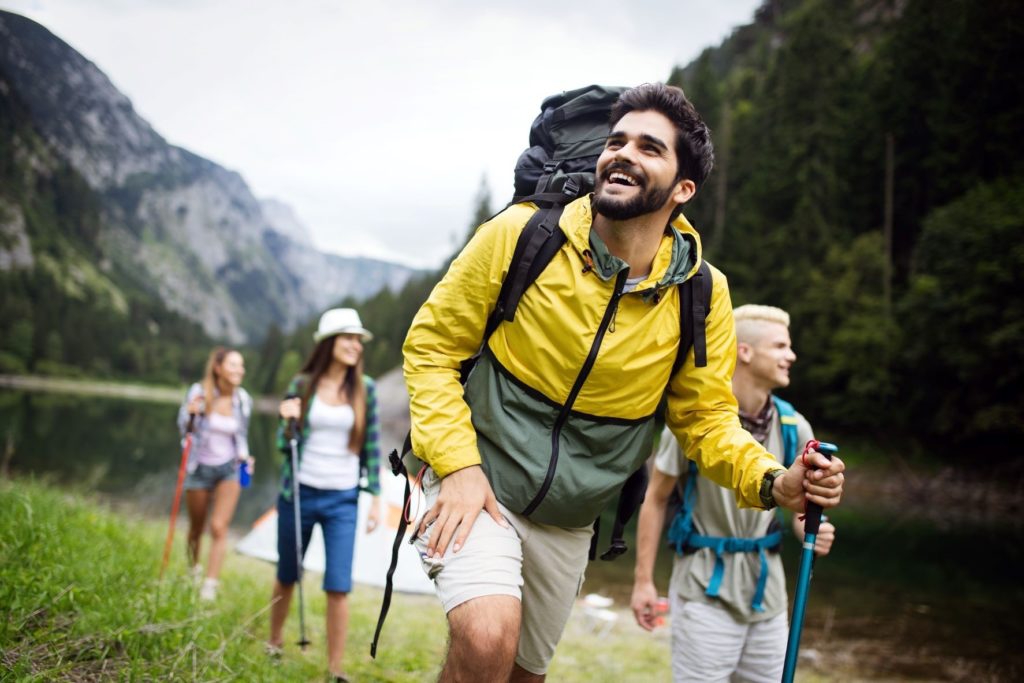In addiction recovery, many different therapeutic interventions work to help an individual heal. These include individual therapy, group therapy, and 12-Step programs. However, many holistic therapies also benefit individuals who are undergoing treatment for mental health conditions or substance use disorders.
One of these is adventure therapy, which uses outdoor activities as a way to help people in treatment learn new skills, cope with emotions, and develop a greater sense of self-awareness. As participants are taken out of their comfort zone and put in adventurous situations, they can reap the many benefits of this increasingly popular type of therapy.
What is Adventure Therapy?
Adventure therapy is a type of experiential therapy that can be used to treat a wide range of mental health challenges. During adventure therapy, participants take part in adventure experiences, usually in a natural setting and with mental health professionals. These outings engage participants on physical, cognitive, emotional, and behavioral levels to promote different types of growth.
These activities are often combined with other therapies, such as cognitive-behavioral therapy or group therapy. Additionally, this therapy is beneficial for individuals with a wide range of conditions, including:
- Anxiety
- Depression
- Trauma
- Post-Traumatic Stress Disorder (PTSD)
- Eating disorders
- Substance use disorders
- Schizophrenia
This type of therapy is based on the premise that by engaging in challenging activities, individuals can learn more about themselves and develop the skills they need to cope with difficult situations. There are many different adventure activities can in adventure therapy, such as hiking, rock climbing, canoeing, and zip lining. While engaging in activities, individuals are not only participating in new and fun activities but are also learning to listen, practice safety, and develop their emotional regulation skills.

Therapy and Addiction
According to a study published in the Journal of Substance Abuse, nature-based therapy is effective in the treatment of substance use disorders. One of the main goals of this type of therapy is to help individuals develop a greater sense of self-efficacy and control. This is often done through activities that challenge individuals both physically and emotionally. Through these activities, individuals learn to trust themselves and others, set boundaries, and practice effective communication.
Adventure therapy has also been found to be helpful in the treatment of other mental health challenges, such as anxiety and depression. nature-based activities can help people to develop a greater sense of accomplishment and self-confidence, while also providing an opportunity to practice coping skills in a safe and supportive environment.
In some cases, adventure-based therapy may not be a good fit for some individuals. People who can not engage in strenuous activity, for example, may not be able to participate. Additionally, individuals with cardiovascular or breathing problems may not be a good fit for adventure therapy. Overall, it is important to speak with a mental health professional to determine if adventure therapy is right for you.
Types of Adventure Therapy
There are three different types of adventure therapy. These three types are wilderness therapy, nature-based therapy, and long-term residential camping. The benefits and goals of each type are largely the same, but the structure will vary widely.
This type of therapy generally lasts anywhere from two weeks to a month. Participants are taken into the wilderness, where they will participate in activities like hiking, camping, and canoeing. The emphasis is on teamwork and developing trust.
This type of therapy generally takes place for a day or weekend. Participants will take part in activities like rock climbing, zip-lining, and ropes courses. The emphasis here is on challenging oneself and building self-confidence.
This type of therapy can last anywhere from a month to a year. Participants live at a camp where they take part in activities like hiking, camping, and canoeing. The emphasis is on developing life skills and learning to live in harmony with others.
The Benefits of Adventure Therapy
In addiction recovery, everyone faces different challenges. No two addiction cases are the same despite the many common issues that addicts face. When adventure therapy is a part of your comprehensive addiction treatment plan, there are many benefits you will see. These benefits include:
- A decrease in symptoms of anxiety and depression
- Increased self-efficacy
- Improved executive functioning
- Reduction in feelings of suicidality
- Improved interpersonal skills
- Identity development
- Improved grit
- Trauma resilience
- Learning to self-advocate for needs
- Accurate clinical assessments
- Diminishes feelings of hopelessness
During adventure therapy, participants are presented with many opportunities to learn, overcome challenges, and grow. While more research is needed, a meta-analysis published in The Open Psychology Journal indicates that adventure therapy shows promising outcomes for those who participate in it. Compared to those who receive traditional talk therapy, adventure therapy participants had increased self-efficacy, improved executive functioning, and a reduction in feelings of suicidality.
Mental Health
Adventure therapy is an effective treatment for a variety of mental health issues, including addiction, depression, anxiety, and PTSD. It can also be used to help individuals who are struggling with adjusting to a new life situation, such as a divorce or the death of a loved one.
Principles Behind Adventure Therapy
The principles behind adventure therapy are based on the belief that individuals can learn new skills and gain confidence by facing challenging situations. Adventure activities help the healing process by providing a sense of accomplishment, helping people to bond with others, and teaching new skills. Generally, adventure therapy is predicated on the following core tenets:
In traditional therapy, patients spend time in a room and talk about their feelings or engage in other activities that encourage reflection. In contrast, action-centered therapy focuses on helping patients to take direct and immediate action toward solving their problems. This type of therapy is based on the belief that change comes from taking action and that by engaging in adventure activities, patients can learn new skills and confidence.
Resistance to change is not conducive to recovery, and many people in treatment start their healing journey feeling stuck. An adventure therapy program gets patients out of their comfort zones and into new environments where they can explore. By leaving their familiar surroundings behind, patients can gain a new perspective on their lives and the issues they are struggling with.
Often, when someone is dealing with addiction or a mental health crisis, change can seem daunting or even impossible. But adventure therapy programs help patients see that change is possible. Through outdoor activities and adventure-based learning, patients can begin to understand that they have the power to make changes in their lives.
When someone is in a natural environment, it can be easier to assess their capabilities. Adventure therapy can help patients understand their strengths and weaknesses, and how they can use those to overcome challenges.
Addiction can be isolating and is often referred to as a lonely disease. In adventure therapy, patients are often in small groups. This allows them to build trust and relationships with others in recovery. These relationships can provide support during difficult times and help patients stay on track with their recoveries.
In many types of therapy, the focus is put on maladaptive behaviors and how a person can change. In adventure therapy, the focus is on successful behaviors. This helps patients see that they are capable of making positive changes in their lives.
Rather than being the authority figure, adventure therapists often take on the role of guide or coach. This helps patients feel more comfortable and allows them to take more ownership of their treatment.

How to Find an Adventure-Based Therapy Program
If you’re interested in adventure therapy, there are a few things to keep in mind when choosing a program. First, not all types of therapy are appropriate for everyone. Make sure to consult with a mental health professional to see if it’s right for you.
Second, not all therapy programs are created equal. Do some research to find a reputable program that has experienced staff and a good track record. Finally, be prepared to commit to one. Any form of therapy is not a quick fix; it takes time and effort to see results.
It is also important to note that therapy is generally available in an inpatient or residential treatment program setting. Therefore, if you want to attend an outpatient addiction treatment program, then you may not be able to engage in adventure-based therapy.
Learn More About Eagle Creek Ranch Recovery’s Therapy Programs
Therapy can be an excellent way to help people of all ages struggling with addiction and mental health issues. At Eagle Creek Ranch Recovery, our adventure therapy program is just one part of our comprehensive addiction treatment plan. To learn more about our program and how we can help you or your loved one overcome addiction, contact us today.

Clinical Director
Kendall Maloof is the clinical director at Eagle Creek Ranch Recovery. She is a licensed marriage and family therapist and has held multiple leadership roles before settling here at Eagle Creek. Kendall received her master’s degree in marriage and family therapy from the Chicago School of Professional Psychology in 2016. Her career in mental and behavioral health began in 2014 when she took up internships in both the nonprofit and for profit sectors. She interned at multiple reputable companies, such as The Living Success Center and 449 Recovery in California.
In 2019, Kendall became the clinical director of Sunsets Recovery for Woman, a dual diagnosis program in southern California. Kendall is a natural leader. She has an incredible ability to problem solve and stay calm in any situation. Kendall never fails to show up when she is needed, and her calm demeanor makes her team and clients feel at ease. Eagle Creek Ranch Recovery is proud to have Kendall as our clinical director.



